ENT201: Entrepreneurship and Small Business Management Report Analysis
VerifiedAdded on 2021/02/21
|8
|2454
|22
Report
AI Summary
This report, focusing on entrepreneurship and small business management, delves into the characteristics, skills, and traits that distinguish successful entrepreneurs. It uses Bill Gates and Henry Ford as case studies to illustrate these qualities, such as passion, self-belief, innovative thinking, and leadership. The report further explores different entrepreneurial aspects through the OCEAN model, examining openness, conscientiousness, extroversion, agreeableness, and neuroticism. It analyzes how background and experience, including the examples of Henry Ford and Bill Gates, can either foster or hinder entrepreneurial success. The conclusion summarizes the importance of innovative ideas and their implementation in the marketplace, highlighting the significance of small businesses and the essential traits for entrepreneurial success. The report references several academic sources to support its findings.
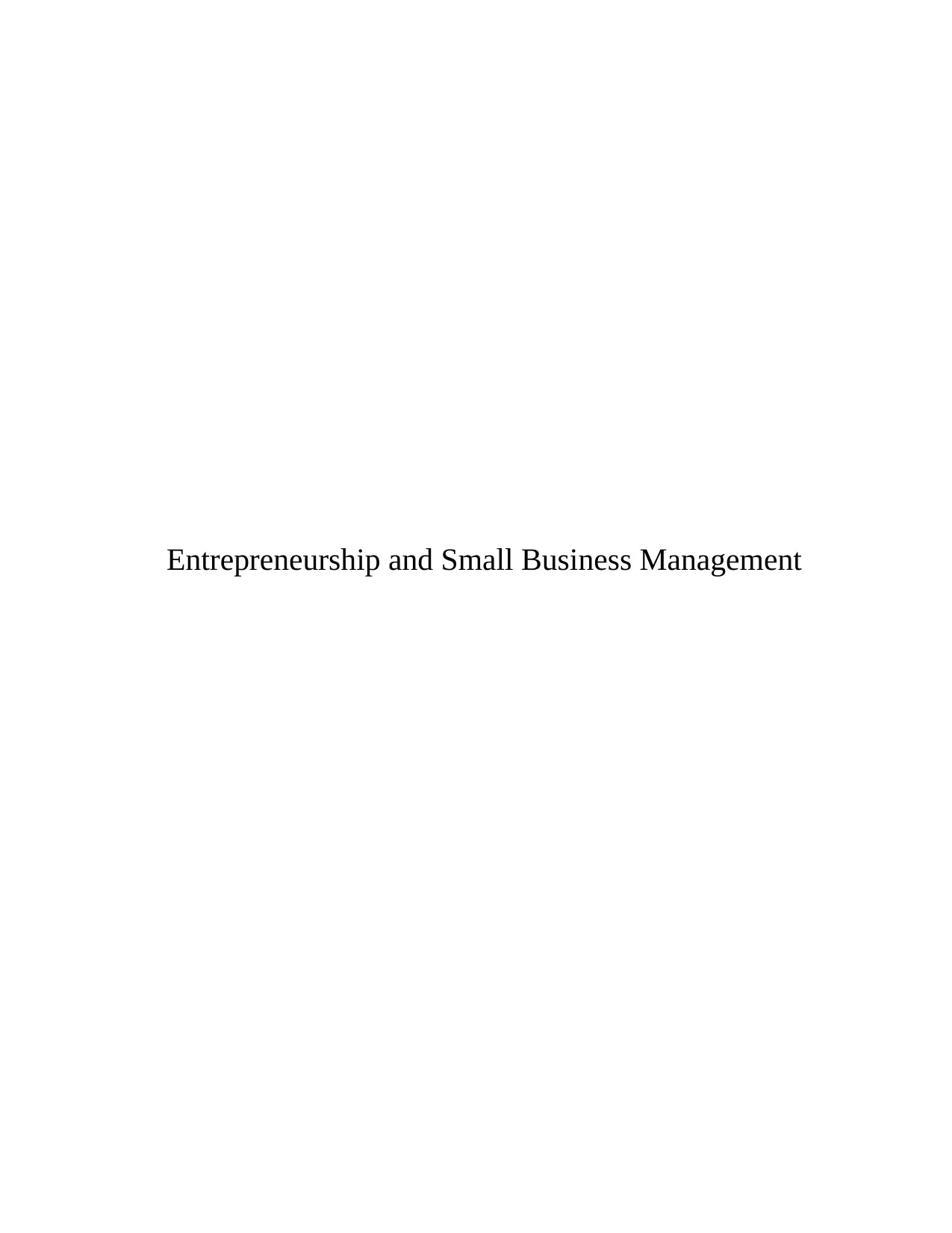
Entrepreneurship and Small Business Management
Paraphrase This Document
Need a fresh take? Get an instant paraphrase of this document with our AI Paraphraser
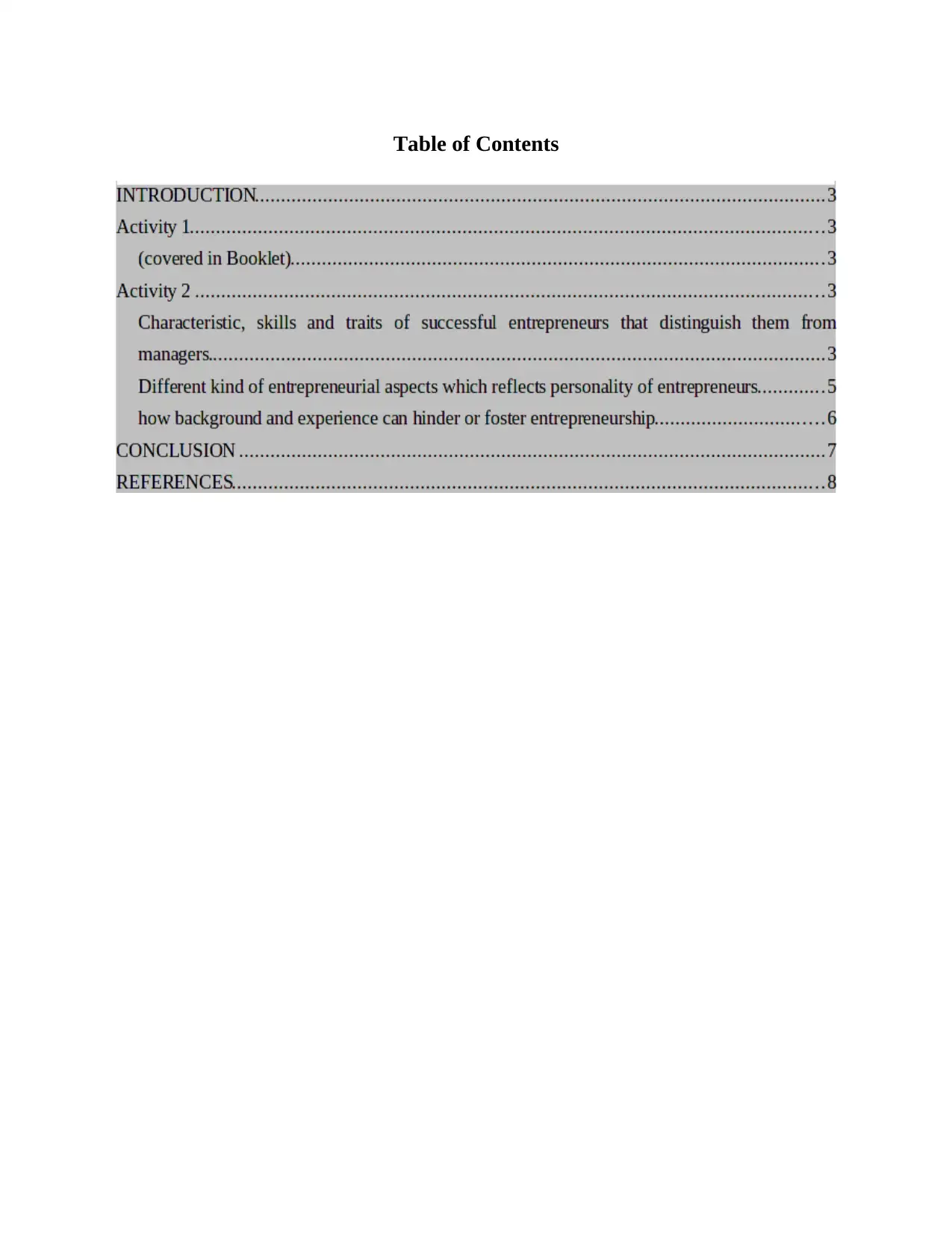
Table of Contents
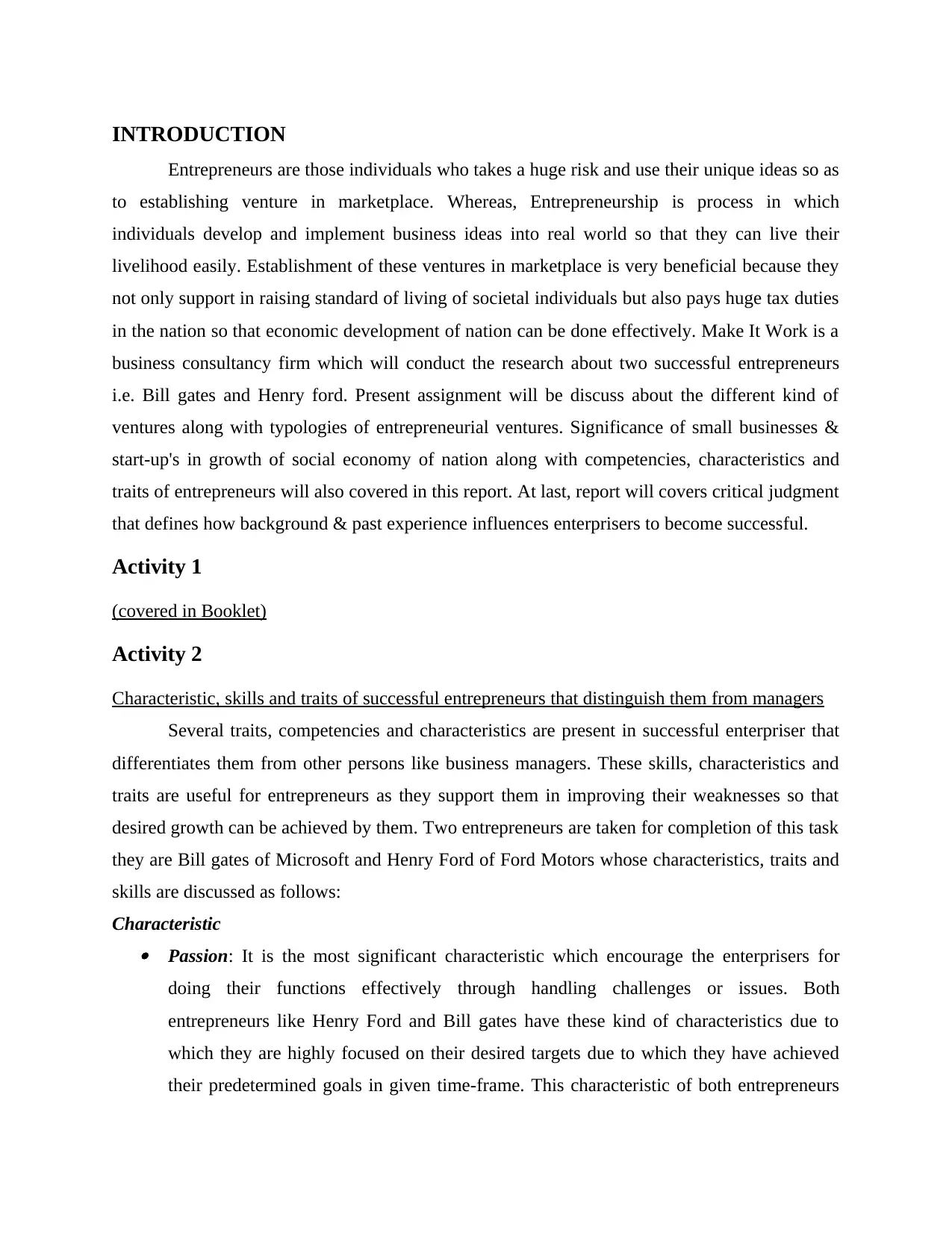
INTRODUCTION
Entrepreneurs are those individuals who takes a huge risk and use their unique ideas so as
to establishing venture in marketplace. Whereas, Entrepreneurship is process in which
individuals develop and implement business ideas into real world so that they can live their
livelihood easily. Establishment of these ventures in marketplace is very beneficial because they
not only support in raising standard of living of societal individuals but also pays huge tax duties
in the nation so that economic development of nation can be done effectively. Make It Work is a
business consultancy firm which will conduct the research about two successful entrepreneurs
i.e. Bill gates and Henry ford. Present assignment will be discuss about the different kind of
ventures along with typologies of entrepreneurial ventures. Significance of small businesses &
start-up's in growth of social economy of nation along with competencies, characteristics and
traits of entrepreneurs will also covered in this report. At last, report will covers critical judgment
that defines how background & past experience influences enterprisers to become successful.
Activity 1
(covered in Booklet)
Activity 2
Characteristic, skills and traits of successful entrepreneurs that distinguish them from managers
Several traits, competencies and characteristics are present in successful enterpriser that
differentiates them from other persons like business managers. These skills, characteristics and
traits are useful for entrepreneurs as they support them in improving their weaknesses so that
desired growth can be achieved by them. Two entrepreneurs are taken for completion of this task
they are Bill gates of Microsoft and Henry Ford of Ford Motors whose characteristics, traits and
skills are discussed as follows:
Characteristic Passion: It is the most significant characteristic which encourage the enterprisers for
doing their functions effectively through handling challenges or issues. Both
entrepreneurs like Henry Ford and Bill gates have these kind of characteristics due to
which they are highly focused on their desired targets due to which they have achieved
their predetermined goals in given time-frame. This characteristic of both entrepreneurs
Entrepreneurs are those individuals who takes a huge risk and use their unique ideas so as
to establishing venture in marketplace. Whereas, Entrepreneurship is process in which
individuals develop and implement business ideas into real world so that they can live their
livelihood easily. Establishment of these ventures in marketplace is very beneficial because they
not only support in raising standard of living of societal individuals but also pays huge tax duties
in the nation so that economic development of nation can be done effectively. Make It Work is a
business consultancy firm which will conduct the research about two successful entrepreneurs
i.e. Bill gates and Henry ford. Present assignment will be discuss about the different kind of
ventures along with typologies of entrepreneurial ventures. Significance of small businesses &
start-up's in growth of social economy of nation along with competencies, characteristics and
traits of entrepreneurs will also covered in this report. At last, report will covers critical judgment
that defines how background & past experience influences enterprisers to become successful.
Activity 1
(covered in Booklet)
Activity 2
Characteristic, skills and traits of successful entrepreneurs that distinguish them from managers
Several traits, competencies and characteristics are present in successful enterpriser that
differentiates them from other persons like business managers. These skills, characteristics and
traits are useful for entrepreneurs as they support them in improving their weaknesses so that
desired growth can be achieved by them. Two entrepreneurs are taken for completion of this task
they are Bill gates of Microsoft and Henry Ford of Ford Motors whose characteristics, traits and
skills are discussed as follows:
Characteristic Passion: It is the most significant characteristic which encourage the enterprisers for
doing their functions effectively through handling challenges or issues. Both
entrepreneurs like Henry Ford and Bill gates have these kind of characteristics due to
which they are highly focused on their desired targets due to which they have achieved
their predetermined goals in given time-frame. This characteristic of both entrepreneurs
⊘ This is a preview!⊘
Do you want full access?
Subscribe today to unlock all pages.

Trusted by 1+ million students worldwide
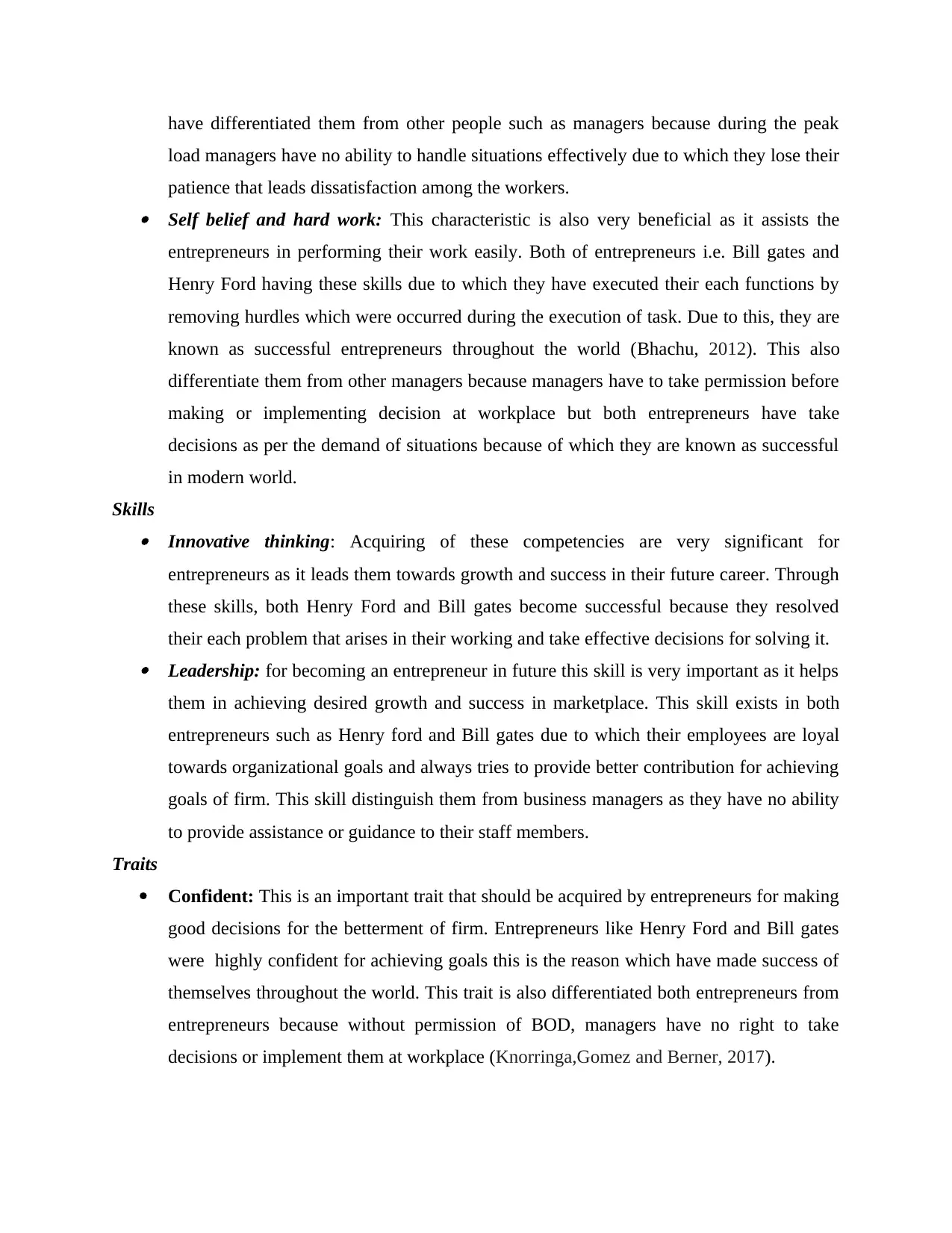
have differentiated them from other people such as managers because during the peak
load managers have no ability to handle situations effectively due to which they lose their
patience that leads dissatisfaction among the workers. Self belief and hard work: This characteristic is also very beneficial as it assists the
entrepreneurs in performing their work easily. Both of entrepreneurs i.e. Bill gates and
Henry Ford having these skills due to which they have executed their each functions by
removing hurdles which were occurred during the execution of task. Due to this, they are
known as successful entrepreneurs throughout the world (Bhachu, 2012). This also
differentiate them from other managers because managers have to take permission before
making or implementing decision at workplace but both entrepreneurs have take
decisions as per the demand of situations because of which they are known as successful
in modern world.
Skills Innovative thinking: Acquiring of these competencies are very significant for
entrepreneurs as it leads them towards growth and success in their future career. Through
these skills, both Henry Ford and Bill gates become successful because they resolved
their each problem that arises in their working and take effective decisions for solving it. Leadership: for becoming an entrepreneur in future this skill is very important as it helps
them in achieving desired growth and success in marketplace. This skill exists in both
entrepreneurs such as Henry ford and Bill gates due to which their employees are loyal
towards organizational goals and always tries to provide better contribution for achieving
goals of firm. This skill distinguish them from business managers as they have no ability
to provide assistance or guidance to their staff members.
Traits
Confident: This is an important trait that should be acquired by entrepreneurs for making
good decisions for the betterment of firm. Entrepreneurs like Henry Ford and Bill gates
were highly confident for achieving goals this is the reason which have made success of
themselves throughout the world. This trait is also differentiated both entrepreneurs from
entrepreneurs because without permission of BOD, managers have no right to take
decisions or implement them at workplace (Knorringa,Gomez and Berner, 2017).
load managers have no ability to handle situations effectively due to which they lose their
patience that leads dissatisfaction among the workers. Self belief and hard work: This characteristic is also very beneficial as it assists the
entrepreneurs in performing their work easily. Both of entrepreneurs i.e. Bill gates and
Henry Ford having these skills due to which they have executed their each functions by
removing hurdles which were occurred during the execution of task. Due to this, they are
known as successful entrepreneurs throughout the world (Bhachu, 2012). This also
differentiate them from other managers because managers have to take permission before
making or implementing decision at workplace but both entrepreneurs have take
decisions as per the demand of situations because of which they are known as successful
in modern world.
Skills Innovative thinking: Acquiring of these competencies are very significant for
entrepreneurs as it leads them towards growth and success in their future career. Through
these skills, both Henry Ford and Bill gates become successful because they resolved
their each problem that arises in their working and take effective decisions for solving it. Leadership: for becoming an entrepreneur in future this skill is very important as it helps
them in achieving desired growth and success in marketplace. This skill exists in both
entrepreneurs such as Henry ford and Bill gates due to which their employees are loyal
towards organizational goals and always tries to provide better contribution for achieving
goals of firm. This skill distinguish them from business managers as they have no ability
to provide assistance or guidance to their staff members.
Traits
Confident: This is an important trait that should be acquired by entrepreneurs for making
good decisions for the betterment of firm. Entrepreneurs like Henry Ford and Bill gates
were highly confident for achieving goals this is the reason which have made success of
themselves throughout the world. This trait is also differentiated both entrepreneurs from
entrepreneurs because without permission of BOD, managers have no right to take
decisions or implement them at workplace (Knorringa,Gomez and Berner, 2017).
Paraphrase This Document
Need a fresh take? Get an instant paraphrase of this document with our AI Paraphraser
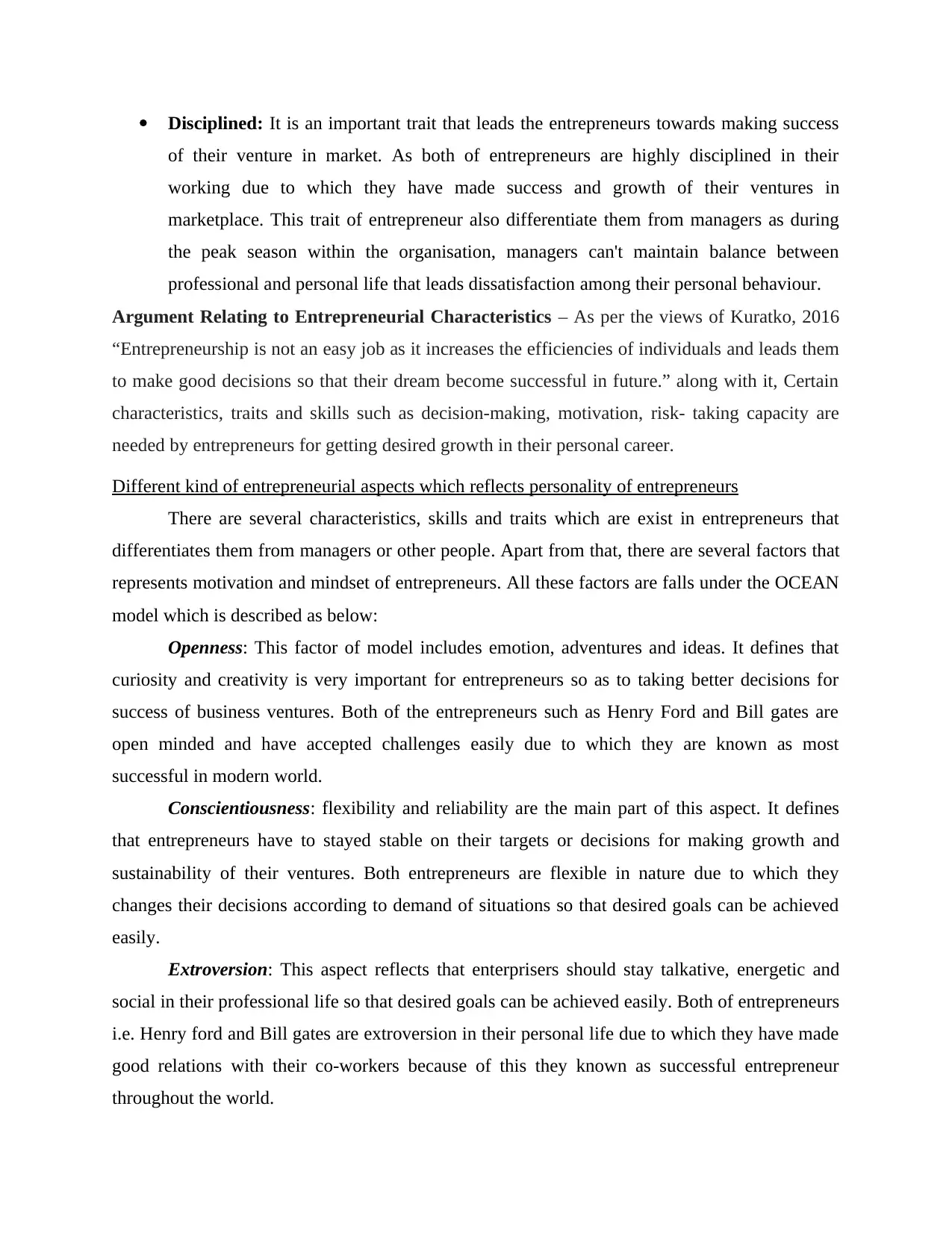
Disciplined: It is an important trait that leads the entrepreneurs towards making success
of their venture in market. As both of entrepreneurs are highly disciplined in their
working due to which they have made success and growth of their ventures in
marketplace. This trait of entrepreneur also differentiate them from managers as during
the peak season within the organisation, managers can't maintain balance between
professional and personal life that leads dissatisfaction among their personal behaviour.
Argument Relating to Entrepreneurial Characteristics – As per the views of Kuratko, 2016
“Entrepreneurship is not an easy job as it increases the efficiencies of individuals and leads them
to make good decisions so that their dream become successful in future.” along with it, Certain
characteristics, traits and skills such as decision-making, motivation, risk- taking capacity are
needed by entrepreneurs for getting desired growth in their personal career.
Different kind of entrepreneurial aspects which reflects personality of entrepreneurs
There are several characteristics, skills and traits which are exist in entrepreneurs that
differentiates them from managers or other people. Apart from that, there are several factors that
represents motivation and mindset of entrepreneurs. All these factors are falls under the OCEAN
model which is described as below:
Openness: This factor of model includes emotion, adventures and ideas. It defines that
curiosity and creativity is very important for entrepreneurs so as to taking better decisions for
success of business ventures. Both of the entrepreneurs such as Henry Ford and Bill gates are
open minded and have accepted challenges easily due to which they are known as most
successful in modern world.
Conscientiousness: flexibility and reliability are the main part of this aspect. It defines
that entrepreneurs have to stayed stable on their targets or decisions for making growth and
sustainability of their ventures. Both entrepreneurs are flexible in nature due to which they
changes their decisions according to demand of situations so that desired goals can be achieved
easily.
Extroversion: This aspect reflects that enterprisers should stay talkative, energetic and
social in their professional life so that desired goals can be achieved easily. Both of entrepreneurs
i.e. Henry ford and Bill gates are extroversion in their personal life due to which they have made
good relations with their co-workers because of this they known as successful entrepreneur
throughout the world.
of their venture in market. As both of entrepreneurs are highly disciplined in their
working due to which they have made success and growth of their ventures in
marketplace. This trait of entrepreneur also differentiate them from managers as during
the peak season within the organisation, managers can't maintain balance between
professional and personal life that leads dissatisfaction among their personal behaviour.
Argument Relating to Entrepreneurial Characteristics – As per the views of Kuratko, 2016
“Entrepreneurship is not an easy job as it increases the efficiencies of individuals and leads them
to make good decisions so that their dream become successful in future.” along with it, Certain
characteristics, traits and skills such as decision-making, motivation, risk- taking capacity are
needed by entrepreneurs for getting desired growth in their personal career.
Different kind of entrepreneurial aspects which reflects personality of entrepreneurs
There are several characteristics, skills and traits which are exist in entrepreneurs that
differentiates them from managers or other people. Apart from that, there are several factors that
represents motivation and mindset of entrepreneurs. All these factors are falls under the OCEAN
model which is described as below:
Openness: This factor of model includes emotion, adventures and ideas. It defines that
curiosity and creativity is very important for entrepreneurs so as to taking better decisions for
success of business ventures. Both of the entrepreneurs such as Henry Ford and Bill gates are
open minded and have accepted challenges easily due to which they are known as most
successful in modern world.
Conscientiousness: flexibility and reliability are the main part of this aspect. It defines
that entrepreneurs have to stayed stable on their targets or decisions for making growth and
sustainability of their ventures. Both entrepreneurs are flexible in nature due to which they
changes their decisions according to demand of situations so that desired goals can be achieved
easily.
Extroversion: This aspect reflects that enterprisers should stay talkative, energetic and
social in their professional life so that desired goals can be achieved easily. Both of entrepreneurs
i.e. Henry ford and Bill gates are extroversion in their personal life due to which they have made
good relations with their co-workers because of this they known as successful entrepreneur
throughout the world.
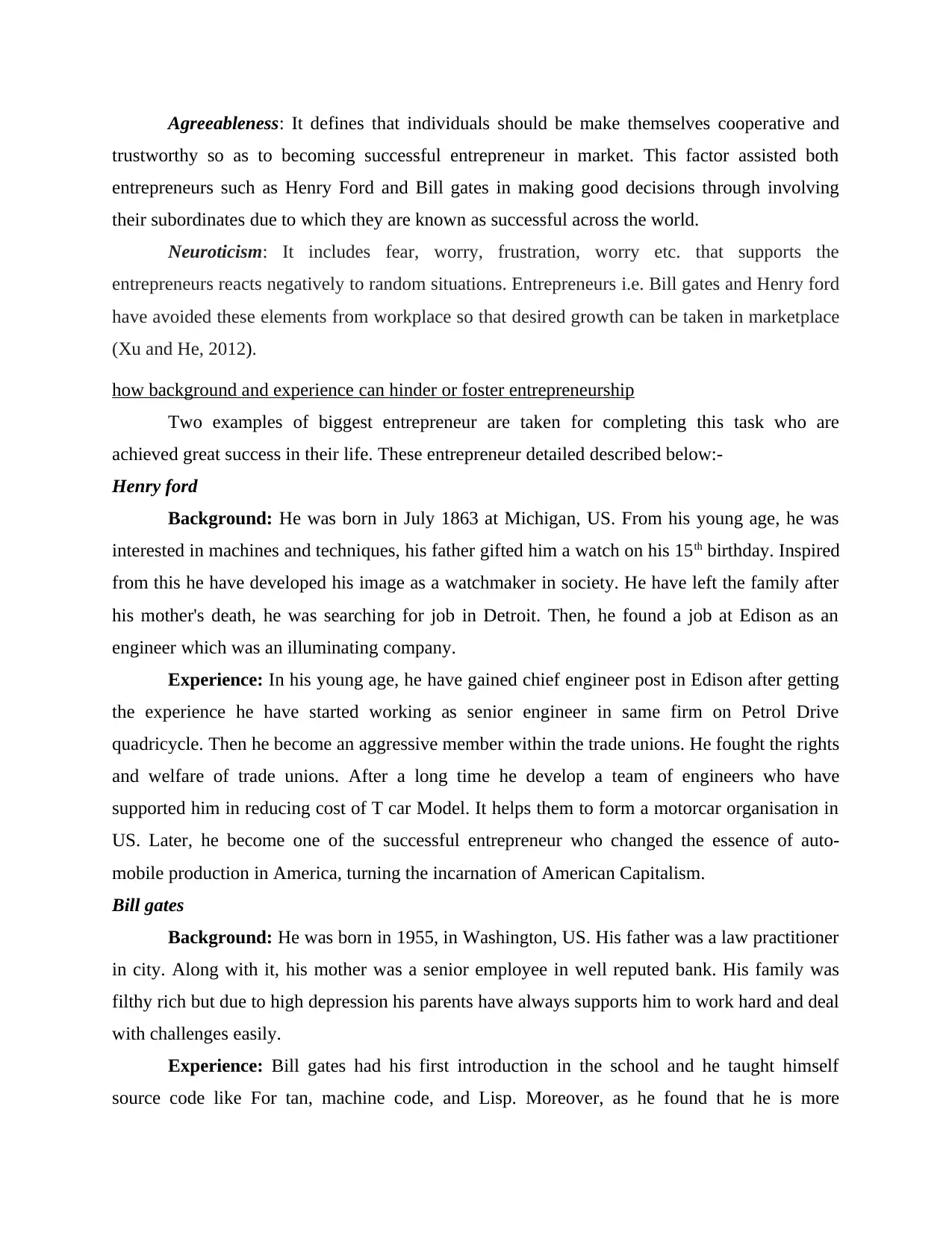
Agreeableness: It defines that individuals should be make themselves cooperative and
trustworthy so as to becoming successful entrepreneur in market. This factor assisted both
entrepreneurs such as Henry Ford and Bill gates in making good decisions through involving
their subordinates due to which they are known as successful across the world.
Neuroticism: It includes fear, worry, frustration, worry etc. that supports the
entrepreneurs reacts negatively to random situations. Entrepreneurs i.e. Bill gates and Henry ford
have avoided these elements from workplace so that desired growth can be taken in marketplace
(Xu and He, 2012).
how background and experience can hinder or foster entrepreneurship
Two examples of biggest entrepreneur are taken for completing this task who are
achieved great success in their life. These entrepreneur detailed described below:-
Henry ford
Background: He was born in July 1863 at Michigan, US. From his young age, he was
interested in machines and techniques, his father gifted him a watch on his 15th birthday. Inspired
from this he have developed his image as a watchmaker in society. He have left the family after
his mother's death, he was searching for job in Detroit. Then, he found a job at Edison as an
engineer which was an illuminating company.
Experience: In his young age, he have gained chief engineer post in Edison after getting
the experience he have started working as senior engineer in same firm on Petrol Drive
quadricycle. Then he become an aggressive member within the trade unions. He fought the rights
and welfare of trade unions. After a long time he develop a team of engineers who have
supported him in reducing cost of T car Model. It helps them to form a motorcar organisation in
US. Later, he become one of the successful entrepreneur who changed the essence of auto-
mobile production in America, turning the incarnation of American Capitalism.
Bill gates
Background: He was born in 1955, in Washington, US. His father was a law practitioner
in city. Along with it, his mother was a senior employee in well reputed bank. His family was
filthy rich but due to high depression his parents have always supports him to work hard and deal
with challenges easily.
Experience: Bill gates had his first introduction in the school and he taught himself
source code like For tan, machine code, and Lisp. Moreover, as he found that he is more
trustworthy so as to becoming successful entrepreneur in market. This factor assisted both
entrepreneurs such as Henry Ford and Bill gates in making good decisions through involving
their subordinates due to which they are known as successful across the world.
Neuroticism: It includes fear, worry, frustration, worry etc. that supports the
entrepreneurs reacts negatively to random situations. Entrepreneurs i.e. Bill gates and Henry ford
have avoided these elements from workplace so that desired growth can be taken in marketplace
(Xu and He, 2012).
how background and experience can hinder or foster entrepreneurship
Two examples of biggest entrepreneur are taken for completing this task who are
achieved great success in their life. These entrepreneur detailed described below:-
Henry ford
Background: He was born in July 1863 at Michigan, US. From his young age, he was
interested in machines and techniques, his father gifted him a watch on his 15th birthday. Inspired
from this he have developed his image as a watchmaker in society. He have left the family after
his mother's death, he was searching for job in Detroit. Then, he found a job at Edison as an
engineer which was an illuminating company.
Experience: In his young age, he have gained chief engineer post in Edison after getting
the experience he have started working as senior engineer in same firm on Petrol Drive
quadricycle. Then he become an aggressive member within the trade unions. He fought the rights
and welfare of trade unions. After a long time he develop a team of engineers who have
supported him in reducing cost of T car Model. It helps them to form a motorcar organisation in
US. Later, he become one of the successful entrepreneur who changed the essence of auto-
mobile production in America, turning the incarnation of American Capitalism.
Bill gates
Background: He was born in 1955, in Washington, US. His father was a law practitioner
in city. Along with it, his mother was a senior employee in well reputed bank. His family was
filthy rich but due to high depression his parents have always supports him to work hard and deal
with challenges easily.
Experience: Bill gates had his first introduction in the school and he taught himself
source code like For tan, machine code, and Lisp. Moreover, as he found that he is more
⊘ This is a preview!⊘
Do you want full access?
Subscribe today to unlock all pages.

Trusted by 1+ million students worldwide
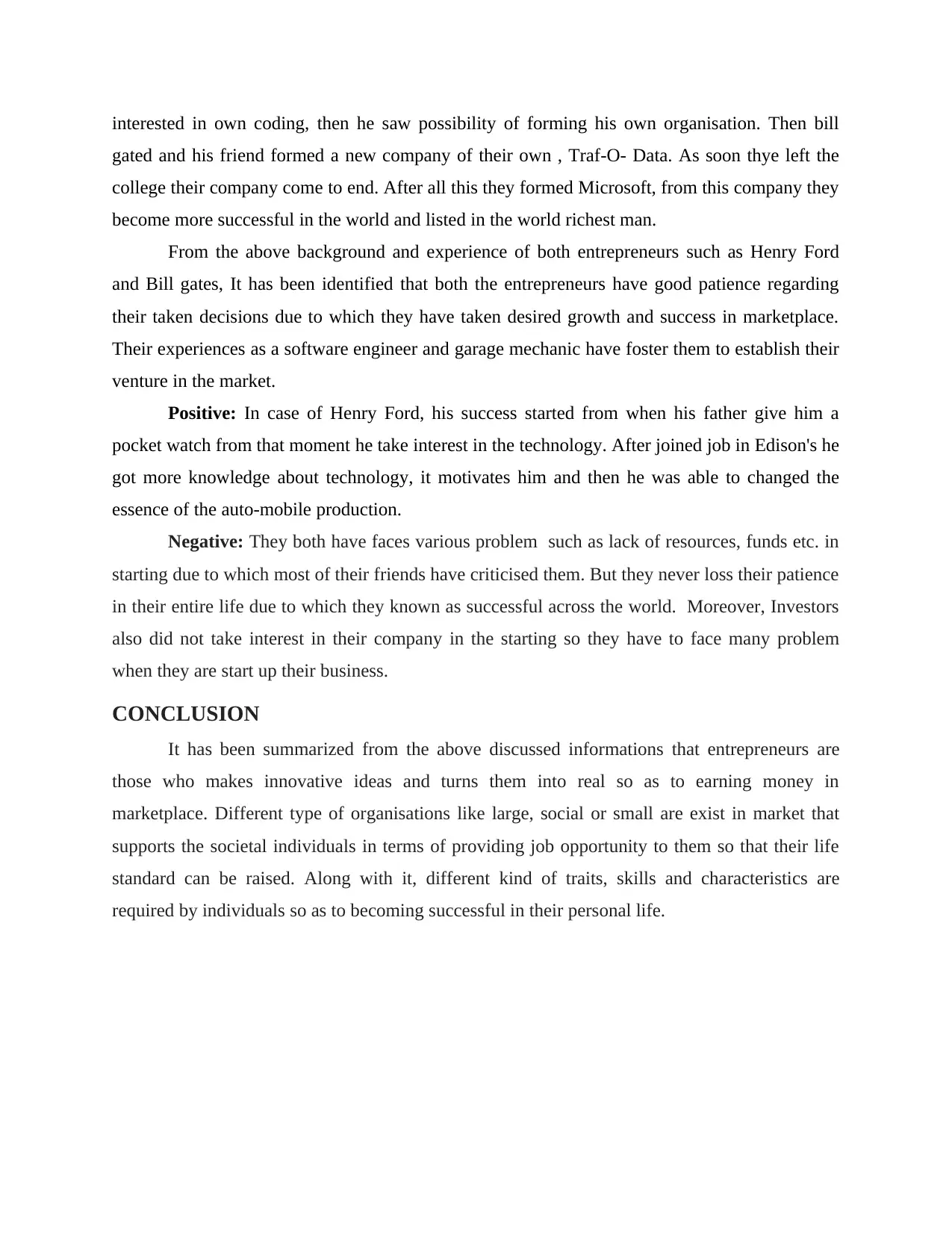
interested in own coding, then he saw possibility of forming his own organisation. Then bill
gated and his friend formed a new company of their own , Traf-O- Data. As soon thye left the
college their company come to end. After all this they formed Microsoft, from this company they
become more successful in the world and listed in the world richest man.
From the above background and experience of both entrepreneurs such as Henry Ford
and Bill gates, It has been identified that both the entrepreneurs have good patience regarding
their taken decisions due to which they have taken desired growth and success in marketplace.
Their experiences as a software engineer and garage mechanic have foster them to establish their
venture in the market.
Positive: In case of Henry Ford, his success started from when his father give him a
pocket watch from that moment he take interest in the technology. After joined job in Edison's he
got more knowledge about technology, it motivates him and then he was able to changed the
essence of the auto-mobile production.
Negative: They both have faces various problem such as lack of resources, funds etc. in
starting due to which most of their friends have criticised them. But they never loss their patience
in their entire life due to which they known as successful across the world. Moreover, Investors
also did not take interest in their company in the starting so they have to face many problem
when they are start up their business.
CONCLUSION
It has been summarized from the above discussed informations that entrepreneurs are
those who makes innovative ideas and turns them into real so as to earning money in
marketplace. Different type of organisations like large, social or small are exist in market that
supports the societal individuals in terms of providing job opportunity to them so that their life
standard can be raised. Along with it, different kind of traits, skills and characteristics are
required by individuals so as to becoming successful in their personal life.
gated and his friend formed a new company of their own , Traf-O- Data. As soon thye left the
college their company come to end. After all this they formed Microsoft, from this company they
become more successful in the world and listed in the world richest man.
From the above background and experience of both entrepreneurs such as Henry Ford
and Bill gates, It has been identified that both the entrepreneurs have good patience regarding
their taken decisions due to which they have taken desired growth and success in marketplace.
Their experiences as a software engineer and garage mechanic have foster them to establish their
venture in the market.
Positive: In case of Henry Ford, his success started from when his father give him a
pocket watch from that moment he take interest in the technology. After joined job in Edison's he
got more knowledge about technology, it motivates him and then he was able to changed the
essence of the auto-mobile production.
Negative: They both have faces various problem such as lack of resources, funds etc. in
starting due to which most of their friends have criticised them. But they never loss their patience
in their entire life due to which they known as successful across the world. Moreover, Investors
also did not take interest in their company in the starting so they have to face many problem
when they are start up their business.
CONCLUSION
It has been summarized from the above discussed informations that entrepreneurs are
those who makes innovative ideas and turns them into real so as to earning money in
marketplace. Different type of organisations like large, social or small are exist in market that
supports the societal individuals in terms of providing job opportunity to them so that their life
standard can be raised. Along with it, different kind of traits, skills and characteristics are
required by individuals so as to becoming successful in their personal life.
Paraphrase This Document
Need a fresh take? Get an instant paraphrase of this document with our AI Paraphraser
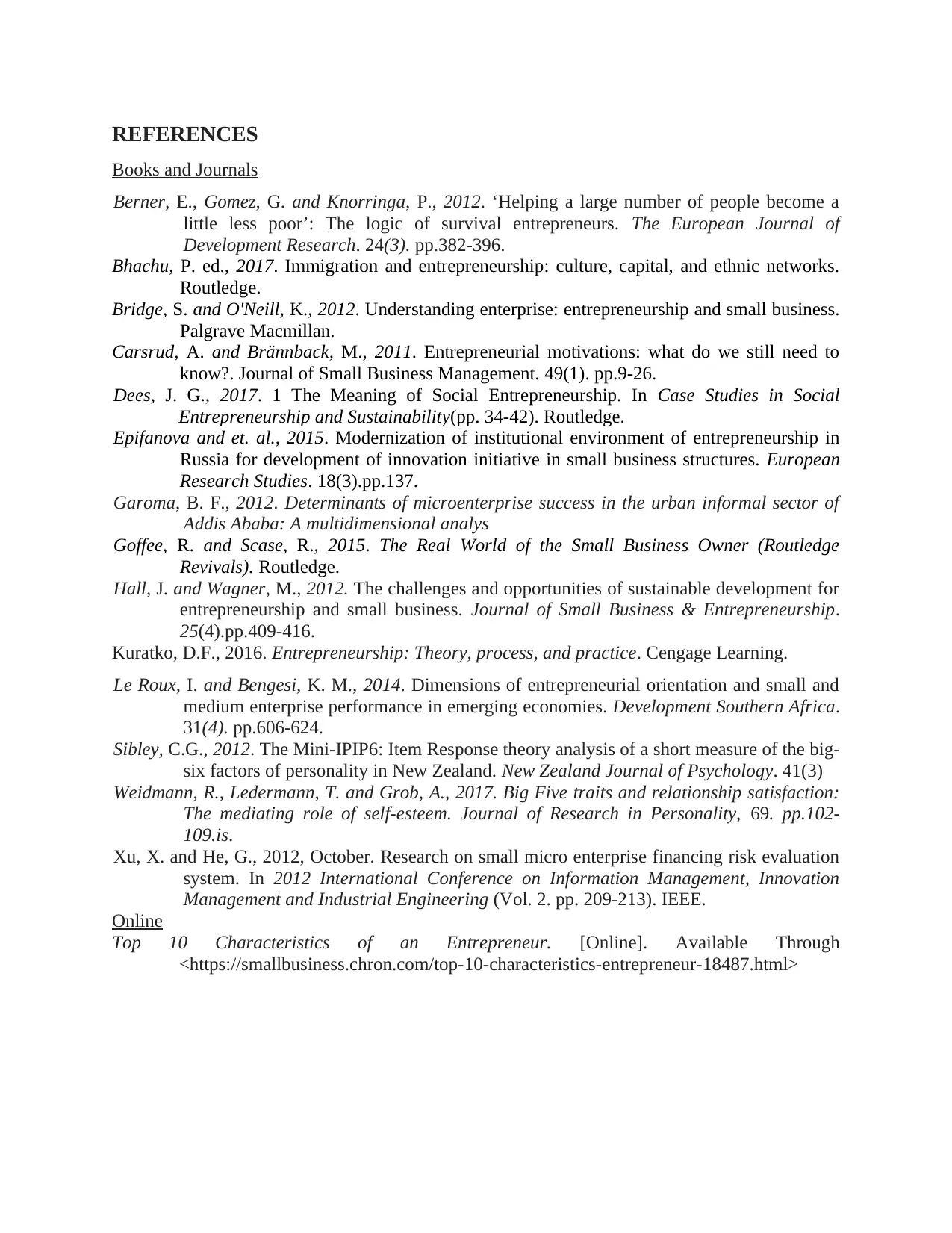
REFERENCES
Books and Journals
Berner, E., Gomez, G. and Knorringa, P., 2012. ‘Helping a large number of people become a
little less poor’: The logic of survival entrepreneurs. The European Journal of
Development Research. 24(3). pp.382-396.
Bhachu, P. ed., 2017. Immigration and entrepreneurship: culture, capital, and ethnic networks.
Routledge.
Bridge, S. and O'Neill, K., 2012. Understanding enterprise: entrepreneurship and small business.
Palgrave Macmillan.
Carsrud, A. and Brännback, M., 2011. Entrepreneurial motivations: what do we still need to
know?. Journal of Small Business Management. 49(1). pp.9-26.
Dees, J. G., 2017. 1 The Meaning of Social Entrepreneurship. In Case Studies in Social
Entrepreneurship and Sustainability(pp. 34-42). Routledge.
Epifanova and et. al., 2015. Modernization of institutional environment of entrepreneurship in
Russia for development of innovation initiative in small business structures. European
Research Studies. 18(3).pp.137.
Garoma, B. F., 2012. Determinants of microenterprise success in the urban informal sector of
Addis Ababa: A multidimensional analys
Goffee, R. and Scase, R., 2015. The Real World of the Small Business Owner (Routledge
Revivals). Routledge.
Hall, J. and Wagner, M., 2012. The challenges and opportunities of sustainable development for
entrepreneurship and small business. Journal of Small Business & Entrepreneurship.
25(4).pp.409-416.
Kuratko, D.F., 2016. Entrepreneurship: Theory, process, and practice. Cengage Learning.
Le Roux, I. and Bengesi, K. M., 2014. Dimensions of entrepreneurial orientation and small and
medium enterprise performance in emerging economies. Development Southern Africa.
31(4). pp.606-624.
Sibley, C.G., 2012. The Mini-IPIP6: Item Response theory analysis of a short measure of the big-
six factors of personality in New Zealand. New Zealand Journal of Psychology. 41(3)
Weidmann, R., Ledermann, T. and Grob, A., 2017. Big Five traits and relationship satisfaction:
The mediating role of self-esteem. Journal of Research in Personality, 69. pp.102-
109.is.
Xu, X. and He, G., 2012, October. Research on small micro enterprise financing risk evaluation
system. In 2012 International Conference on Information Management, Innovation
Management and Industrial Engineering (Vol. 2. pp. 209-213). IEEE.
Online
Top 10 Characteristics of an Entrepreneur. [Online]. Available Through
<https://smallbusiness.chron.com/top-10-characteristics-entrepreneur-18487.html>
Books and Journals
Berner, E., Gomez, G. and Knorringa, P., 2012. ‘Helping a large number of people become a
little less poor’: The logic of survival entrepreneurs. The European Journal of
Development Research. 24(3). pp.382-396.
Bhachu, P. ed., 2017. Immigration and entrepreneurship: culture, capital, and ethnic networks.
Routledge.
Bridge, S. and O'Neill, K., 2012. Understanding enterprise: entrepreneurship and small business.
Palgrave Macmillan.
Carsrud, A. and Brännback, M., 2011. Entrepreneurial motivations: what do we still need to
know?. Journal of Small Business Management. 49(1). pp.9-26.
Dees, J. G., 2017. 1 The Meaning of Social Entrepreneurship. In Case Studies in Social
Entrepreneurship and Sustainability(pp. 34-42). Routledge.
Epifanova and et. al., 2015. Modernization of institutional environment of entrepreneurship in
Russia for development of innovation initiative in small business structures. European
Research Studies. 18(3).pp.137.
Garoma, B. F., 2012. Determinants of microenterprise success in the urban informal sector of
Addis Ababa: A multidimensional analys
Goffee, R. and Scase, R., 2015. The Real World of the Small Business Owner (Routledge
Revivals). Routledge.
Hall, J. and Wagner, M., 2012. The challenges and opportunities of sustainable development for
entrepreneurship and small business. Journal of Small Business & Entrepreneurship.
25(4).pp.409-416.
Kuratko, D.F., 2016. Entrepreneurship: Theory, process, and practice. Cengage Learning.
Le Roux, I. and Bengesi, K. M., 2014. Dimensions of entrepreneurial orientation and small and
medium enterprise performance in emerging economies. Development Southern Africa.
31(4). pp.606-624.
Sibley, C.G., 2012. The Mini-IPIP6: Item Response theory analysis of a short measure of the big-
six factors of personality in New Zealand. New Zealand Journal of Psychology. 41(3)
Weidmann, R., Ledermann, T. and Grob, A., 2017. Big Five traits and relationship satisfaction:
The mediating role of self-esteem. Journal of Research in Personality, 69. pp.102-
109.is.
Xu, X. and He, G., 2012, October. Research on small micro enterprise financing risk evaluation
system. In 2012 International Conference on Information Management, Innovation
Management and Industrial Engineering (Vol. 2. pp. 209-213). IEEE.
Online
Top 10 Characteristics of an Entrepreneur. [Online]. Available Through
<https://smallbusiness.chron.com/top-10-characteristics-entrepreneur-18487.html>
1 out of 8
Related Documents
Your All-in-One AI-Powered Toolkit for Academic Success.
+13062052269
info@desklib.com
Available 24*7 on WhatsApp / Email
![[object Object]](/_next/static/media/star-bottom.7253800d.svg)
Unlock your academic potential
Copyright © 2020–2026 A2Z Services. All Rights Reserved. Developed and managed by ZUCOL.





